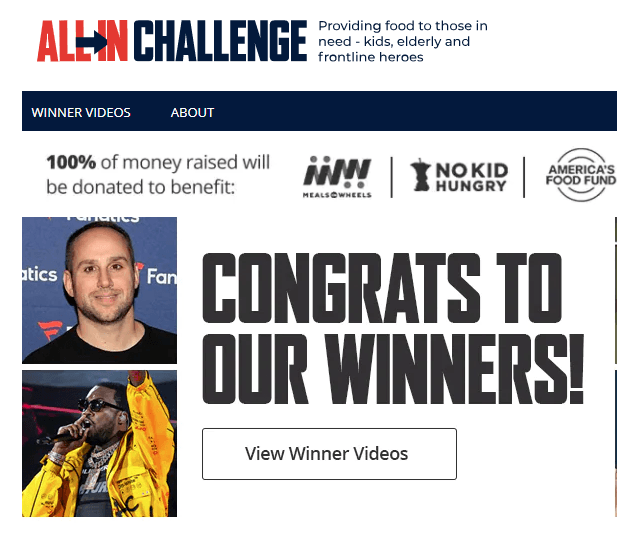Can I Ask for a Donation and Draw a Prize
As the UK continues to operate under lockdown, more and more brands are asking 'what can we do to help?'. Some agile brands are now 'pivoting' to make supplies for the NHS, whilst others are looking at ways in which they can either directly, or via consumers, encourage donations to the many worthy charities that are making a difference during the Coronavirus pandemic.
The All in Challenge by US operator, Fanatics, is seeking to raise $100m for US welfare charities by seeking donations from the public and each dollar donated guarantees an entry into prize draws to win fan experiences ranging from running a lemonade stand with Ryan Reynolds, co-hosting the Ellen DeGeneres show or a walk-on role in the next Martin Scorsese film.

Closer to home, brands are giving away their products in prize draws to attract donations- so retailer American Golf are offering NHS branded clubs in a prize draw in return for £5 to the NHS whilst jeweller Monika Vinader and florist Bloom and Wild are just two of the great British brands offering prizes in a prize draw to help NHS staff. Good stuff, but as our Compliance Manager, Amy Powell, reveals there are still rules that need to be followed:
Charity raffle prizes, draws or lottery?
In the UK, if a brand is giving away the chance to win a prize in return for a donation to charity (also known as donate and win) it is a 'prize draw'. But when you add in the requirement to pay to enter, via a donation, what is in effect a game of chance becomes a lottery; a form of gambling. Under the Gambling Act 2005, Lotteries can only be run by charities and good causes who have obtained a Lottery licence and not for commercial gain. There are also additional CAP Code rules about who can run them, and how they must be run and promoted.
Brands usually run legitimate lotteries through pages such as Just Giving under the umbrella of a charity that has obtained a lottery licence. But they must still ensure that the donation cost for each entry is equal for all entrants and have over 18 age verification measures in place. Find out more about lottery licences here.
Avoiding a lottery licence
If you do not want to apply for a lottery licence you have two options. The first is to include a No Purchase Necessary route for entry, so that it is not mandatory to donate. Usually this is via post, but the communication of this route must be clear in all communications and all such entrants must have the same chance of winning as those who pay/donate.
The second option is to move it from being a charity prize draw, to being a Competition, with an element of skill, knowledge or judgement that will 'prevent a significant proportion of people taking part' or a 'significant proportion of people who do take part are prevented from receiving a prize' i.e. they are losers. (Source; Gambling Act 2005). Even if all those successfully completing a valid level of skill are then entered into a prize draw this will be outside of the Gambling Act, because there was that element of skill involved in the first place.
The important thing to remember here is to pitch the skill at the right level. Too hard, and you will be okay legally, but you will deter too many people from entering. Too easy – such as 'what is the colour of the sky' – and you risk a legal challenge from the all-powerful Gambling Commission (something that we have seen with increasing frequency).
Remember the CAP Code
The CAP Code provides an additional, more practical, set of rules surrounding the marketing communications for lotteries. They seek to ensure fairness, clarity, that they are socially responsible and protect the young and the vulnerable. In particular you must not suggest that participating in a lottery can provide escape from problems or financial concerns, or that it is indispensable, a rite of passage or linked with popularity or success. Marketing for charity prize draws and lotteries must also not appeal to under 16s or feature anyone who appears to be under 25 in a meaningful role. Plus, the usual CAP Code requirements on winner selection remain. If it is a draw, the selection should be conducted under independent supervision or by an independent entity, and if it is a competition, with answers open to subjective interpretation, then at least one of the judges must be independent.
In addition, where proceeds go to charity there are a whole host of additional rules to consider. The amount going to be charity must be stated, either a total, a minimum or a per entry. Phrases such as 'Proceeds to X Charity' are not allowed because they have proved too vague and open to abuse in the past. Equally, the formal written permission of the proposed charity must be obtained before involving them in your branded activity.
Running a charity prize draw is one way brands can engage with the public whilst doing good during the current crisis, but do not ignore the fact it still has to be run legally. To find out more about running lotteries or prize draws connected to charities contact PromoVeritas on 0203 325 6000 or email info@promoveritas.com.
Can I Ask for a Donation and Draw a Prize
Source: https://www.promoveritas.com/charity-prize-draws/